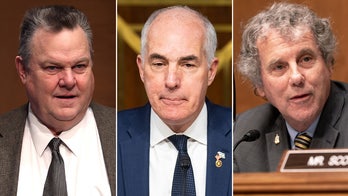House lawmakers, back in Washington for a brief pre-election session, proposed a bill Monday to make sure the government doesn't shut down at the end of the month.
Lawmakers unveiled a six-month, $1 trillion spending bill that would finance the government's day-to-day operations until next March. The short-term budget bill is what's known as a "continuing resolution," or CR, and without it the government would largely close its doors.
Averting that shut-down, though, represents the bare minimum for what Congress could conceivably tackle.
The abbreviated September session -- expected to last no longer than this week and next -- leaves a huge pile of business for a lame duck session.
Topping the list is the expiration of the full menu of President George W. Bush-era tax rates on Dec. 31. The resulting tax increases, when combined with more than $100 billion in automatic across-the-board spending cuts set to take effect at the same time, have become known as the fiscal cliff. Economists warn that unless Congress acts, the one-two austerity punch would send the fragile economy back into recession.
The automatic cuts are punishment for the inability of last year's deficit reduction "supercommittee" to strike a bargain to cut 10-year deficits by at least $1.2 trillion as promised by last summer's debt and budget pact.
Other pressing issues for the lame-duck session include averting an almost 30 percent cut in physicians' Medicare fees, the food and farm bill, passing the annual Pentagon policy bill, a Russia free trade bill and legislation to reform the Postal Service, which is now losing $25 million a day. Congressional inaction now would mean the Postal Service will default on a $5.5 billion payment into its retiree health care fund that's due at the end of the month.
The stopgap spending bill being rolled out this week is expected to pass easily.
Less certain, though, is whether a badly gridlocked Congress will be able to find a solution on what to do about food aid and farm subsidies set to expire at the end of the month.
The Senate has passed a five-year farm bill to overhaul crop safety net programs while funding food stamps for more than 46 million people. But the food and farm legislation has bedeviled House leaders because many GOP conservatives want deeper cuts to food stamps than Democrats, whose votes are needed to pass the measure, are willing to support.
House Majority Whip Kevin McCarthy, R-Calif., said Monday that GOP leaders intend to bring the measure to the floor before the election, though the measure has yet to appear on any floor schedule. Probably more likely is an attempt to temporarily extend the old bill, including drought aid for livestock producers whose assistance programs expired last year.
But it's not certain lawmakers will do even that. Without a formal extension, food stamp and other nutrition programs would continue to function beyond Sept. 30. Most farmers would not be affected because the current farm bill covers 2012 crops regardless of when they are harvested.
The Associated Press contributed to this report.




